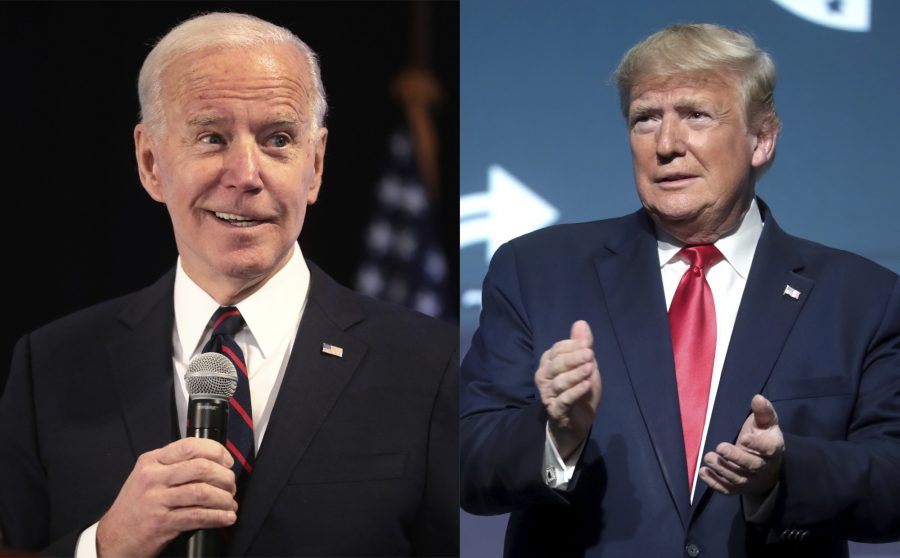Editor’s Notes: This story was produced as part of the Daily Wildcat’s “Election Guide” special print edition, published Wednesday, Oct. 21, and available on campus or online.
The 2020 presidential election is less than three weeks away, and amidst a global pandemic that has taken over 215,000 lives across the country, the future of the U.S. healthcare system is at the forefront of many voters’ minds.
Current President Donald Trump and former Vice President Joe Biden have different beliefs when it comes to the healthcare landscape of the U.S., to say the least. Let’s take a deeper look at the healthcare policies of the two presidential candidates through the lenses of the Affordable Care Act, reproductive rights and Medicare/Medicaid.
Affordable Care Act:
On March 23, 2010, the Affordable Care Act was passed. This law, signed by former President Barack Obama, widely expanded health coverage across the country, brought new attention to preventive medicine and reduced discrimination of peoples with pre-existing health conditions.
Trump: The current president kicked off his presidency in 2016 with a promise to end the law “on day 1,” saying that it unfairly requires people and large companies to buy insurance or pay a heavy fine. Trump believes the ACA is unconstitutional and supports the lawsuit that would strike down the bill.
Biden: A crucial part of Biden’s healthcare plan is to defend the ACA from congressional and legal challenges, including its potential strike by the Supreme Court. If elected, Biden would let the ACA stay in place.
According to Biden’s website, “because of Obamacare, over 100 million people no longer have to worry that an insurance company will deny coverage or charge higher premiums just because they have a pre-existing condition – whether cancer or diabetes or heart disease or a mental health challenge.”
RELATED: President Trump’s COVID-19 treatment plan: What was it exactly?
Reproductive rights:
Trump: He has sought to expand a federal ban on funding for clinics that provide abortions, and has moved to cut funding for the Planned Parenthood Federation of America.
This month, a federal court struck down those restrictions, setting up a potential ruling from the Supreme Court. Earlier this year, the Trump administration asked Planned Parenthood affiliates around the U.S. to return millions of dollars in loans from the federal government’s COVID-19 relief package.
In addition, the president repealed President Obama’s anti-discrimination provisions for LGBTQ+ patients and for those who have terminated a pregnancy.
Biden: Despite a shift in his stance from a few decades ago, the Democratic nominee supports funding for clinics that provide abortions. Biden has made it clear that he will restore federal funding for Planned Parenthood and other reproductive care providers.
Biden has also vowed to put back former President Obama’s anti-discrimination provisions for LGBTQ+ patients and for those who have terminated a pregnancy.
RELATED: New research shows that pain relief from coronavirus may explain large asymptomatic crowd
Medicare/Medicaid:
Medicare is a federal program that subsidizes healthcare services for anyone over 65, younger people with specific eligibility criteria and people with certain diseases.
On the other hand, Medicaid is a federal and state program that helps with medical costs for some people with limited income and resources. The program also may offer other benefits, including nursing home care and personal care services.
Trump: In August, Trump signed an executive order unilaterally cutting payroll taxes, a primary funding vehicle for Medicare and Social Security. The sitting president wants to expand the use of private Medicare insurers and has vowed to keep the payroll tax cut permanent.
Similarly, Trump has proposed several budgets to Congress requesting significant cuts to Medicaid as well. The administration has also supported new work requirements for Medicaid beneficiaries.
Biden: A crucial aspect of the former vice president’s plan is to extend Medicare coverage to adults ages 60 to 64, nearly an additional 20 million people. Furthermore, Biden will repeal the existing law explicitly barring Medicare from negotiating lower prices with drug corporations, according to his website.
A crucial aspect of the former vice president’s plan is to expand Medicaid coverage. According to Biden’s website, “governors and state legislatures in 14 states have refused to take up the Affordable Care Act’s expansion of Medicaid eligibility, denying access to Medicaid for an estimated 4.9 million adults.”
His plan focuses on offering premium-free access to the public option to those 4.9 million individuals and “making sure their public option covers the full scope of Medicaid benefits.”
RELATED: Temperature checks: Are they a powerful tool for detecting infected individuals or simply futile?
Clearly, the two presidential candidates have widely differing beliefs when it comes to the U.S. healthcare landscape. Amidst a global pandemic with no end in sight, the future of the country’s healthcare system will be paramount for which direction the U.S. heads in next year.
Follow Amit Syal on Twitter









